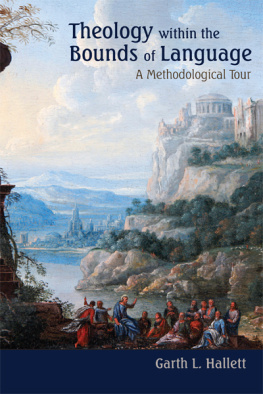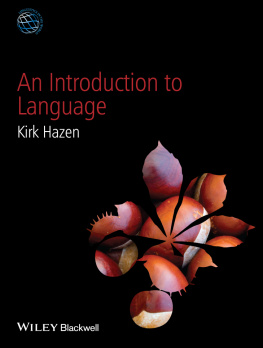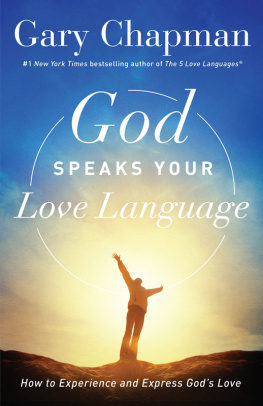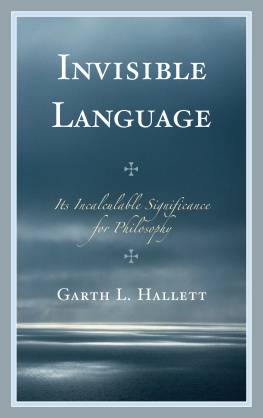Theology within the
Bounds of Language
A Methodological Tour

Garth L. Hallett

Published by State University of New York Press, Albany
2011 State University of New York
All rights reserved
Printed in the United States of America
No part of this book may be used or reproduced in any manner whatsoever without written permission. No part of this book may be stored in a retrieval system or transmitted in any form or by any means including electronic, electrostatic, magnetic tape, mechanical, photocopying, recording, or otherwise without the prior permission in writing of the publisher.
For information, contact State University of New York Press, Albany, NY
www.sunypress.edu
Production by Eileen Meehan
Marketing by Anne M. Valentine
Library of Congress Cataloging-in-Publication Data
Hallett, Garth L.
Theology within the bounds of language : a methodological tour /
Garth L. Hallett.
p. cm.
Includes bibliographical references (p. ) and index.
ISBN 978-1-4384-3369-1 (hardcover : alk. paper)
1. Language and languagesReligious aspectsChristianity. 2. TheologyMethodology. I. Title.
BR115.L25H35 2011
230.01'4dc22 2010020729
10 9 8 7 6 5 4 3 2 1
Preface
In Water Buffalo Theology, Kosuke Koyama queries the impressive discussions on methodology which he has met in the writings of fellow theologians: How do they know where they are going before they start walking? How can they describe the changing scenery before they see it? What space is there for such unexpected events as the disciples encountered on the way to Emmaus? The reader need not fear that I shall transgress in any of these ways. Yet at least one fundamental aspect of theological activity, discernible already in Koyama's closing allusion, can be anticipated in advance. The stranger the disciples met spoke with them: [B]eginning with Moses and all the prophets, he interpreted to them the things about himself in all the scriptures (Acts 24:27). They, in turn, spoke to one another: Were not our hearts burning within us while he was talking to us on the road? (Acts 24:32) Returning in haste to Jerusalem, they heard from those there: The Lord is risen indeed and he has appeared to Simon (Acts 24:34). Thereupon, they told what had happened on the road, and how he had been made known to them in the breaking of the bread (Acts 24:35). He spoke, they spoke to one another, others conversed with them, they repliedso Christian theology began, and so it has continued ever since: ineluctably linguistic.
In those early exchanges at Emmaus, Jerusalem, and along the road, we see language at the service of truth, of community, and of both together: at the service of truth for the sake of community and at the service of community for the sake of truth. Since then, language has served in both of these ways within Christian theology, and when its role has there been ignored or misunderstood, both truth and community have suffered, often seriously. This is not surprising, for much obscurity surrounds the relationship between language and truth, and the pursuit of truth without due regard for language or understanding of its proper functioning adversely affects the communicative, communitarian aspect of theology. Of modern Western philosophy Thomas McCarthy has observed: What has been too often ignored and always underanalyzed is the pervasive normativity of social life. The like might be said of theology as a form of social life and of the normativity, or authoritative role, of language in its conduct. Though basic, that role has too often been ignored and too often underanalyzed, even in works of fundamental theology or theological method, where acknowledgment of its importance would be most appropriate and might therefore be expected. The present work is offered as a partial remedy for this neglect.
Much has been written, to be sure, about theology and language. Outside this work's chosen focus, on theological discourse, an ample literature has addressed questions of hermeneutics and biblical interpretation. Inside the focus, a more directly relevant body of theological writing resulted from the linguistic turn in philosophy that crested in the middle decades of the last century. However, no previous work closely resembles the present one. My own early Darkness and Light: The Analysis of Doctrinal Statements, drawing on a previous study of Wittgenstein's treatment of word meaning and a commentary on his classic Philosophical Investigations, comes as close as any but, as the subtitle suggests, focused more on analyzing doctrinal statements than on formulating them. A number of my subsequent works Thus, although in various places I have read or written about most of the matters here discussed, it occurred to me that, rather than leave them scattered here and there, I should bring them together within a single cover and supplement them with some neglected topics. A brief compendium seemed desirable.
It soon became evident, though, that I would not be able to develop these varied materials in strictly systematic fashion, as in a mathematical demonstration or a map of central Manhattan. Language, wrote Wittgenstein, is a labyrinth of paths. You approach from one side and know your way about; you approach the same place from another side and no longer know your way about. Although the present quick reconnaissance may not suffice to beget such mastery, still, I like Wittgenstein's comparison. Since language, like London, is not systematic, there is no way to tour it systematically. A given street leads to a lane here, an alley there, a square farther on, and to other streets that meet or cross it. A guide can pass smoothly and without break from the first street into another, or into the lane, the alley, or the square, but not into all at once. After taking one direction, it is necessary to cut back to follow the others. And yet, a guide showing visitors around London can manage without too much confusion, and so, I trust, shall I.
I offer the present tour for interested theologians as well as for students of theology. The sample passages at the end of each chapter, stimulating and broadening reflection on the chapter's themes, should interest both categories of prospective readers. The passages have, in fact, proved helpful to colleagues in locating each chapter within a larger literature and sensing its significance more fully, and have proved handy in classroom instruction. There, once a basis is provided by the text, discussion can take any of the directions suggested by the quotations, according to student interests and preferences. Some passages will agree with the text, while others will disagree; some will lead to related issues, while others will open new perspectives. All can stimulate further reflection and discussion. On offer here, then, is a workbook.
Its practical nature should be noted so as to avoid an unfortunate impression. For the book's focus, understandably, is more on problematic modes of theological discourse than on those which occasion little concern. In this respect it resembles, say, a text of informal logic. There, the many fallacies reviewed, and the unfortunate examples that illustrate them, might impart a jaundiced view of human beings' allegedly rational nature. Here, a similarly negative impression, of theologians and their trade, might arise. For here, too, more benefit will come from attending to problematic than to unproblematic thinking. Here too, accordingly (indeed, especially here), it may be necessary to reassure the reader from the start: the present study does not pretend to offer a balanced survey of theological practice. Positive exposition accompanies critique, and sound sample passages mix with unsound, but, to borrow a saying, those who are well have no need of a physician.







